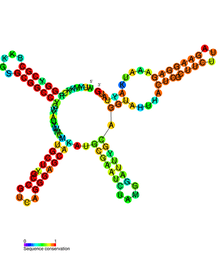IbpB thermometer
The IbpB thermometer is an RNA thermometer element found in the ibpAB operon.[1] The operon contains two heat-shock genes, encoding inclusion body binding proteins A and B (IbpA/B), and is the most drastically upregulated operon under heat-shock in Escherichia coli.[2]
| IbpB thermometer | |
|---|---|
 Conserved secondary structure of the IbpB thermometer | |
| Identifiers | |
| Symbol | ibpB 5' UTR |
| Other data | |
| RNA type | RNA thermometer |
| Domain(s) | E. coli |
| PDB structures | PDBe |
IbpA is regulated by a ROSE element found in its 5' UTR,[3][4] while IbpB has its own heat-sensitive cis-regulatory element. The activity of this thermoregulator was confirmed in vitro but was not found in vivo, suggesting more complicated operon regulation exists in bacterial cells.[1]
IbpB protein
The IbpB protein, whose expression is regulated by the IbpB thermometer, is 48% identical to IbpA (at the level of amino acid sequence) yet fulfils a different role in heat shock. When IbpB is absent, IbpA protein will form long fibrils which is unusual for a heat shock protein; IbpB, acting as a co-chaperone, inhibits IbpA from forming this structure.[5]
Under heat shock, IbpB protein dissociates to give two smaller subunits and also rearranges its tertiary structure.[6] This "remarkable conformational transformation"[7] is thought to be essential for IbpB to act as a co-chaperone with IbpA under heat shock.[8]
IbpB has been found to retain active for a significant time after a heat shock stimulus has been removed.[7]
References
- Gaubig LC, Waldminghaus T, Narberhaus F (January 2011). "Multiple layers of control govern expression of the Escherichia coli ibpAB heat-shock operon". Microbiology. 157 (Pt 1): 66–76. doi:10.1099/mic.0.043802-0. PMID 20864473.
- Richmond CS, Glasner JD, Mau R, Jin H, Blattner FR (October 1999). "Genome-wide expression profiling in Escherichia coli K–12". Nucleic Acids Research. 27 (19): 3821–3835. doi:10.1093/nar/27.19.3821. PMC 148645. PMID 10481021.
- Waldminghaus T, Gaubig LC, Klinkert B, Narberhaus F (Sep–Oct 2009). "The Escherichia coli ibpA thermometer is comprised of stable and unstable structural elements". RNA Biology. 6 (4): 455–463. doi:10.4161/rna.6.4.9014. PMID 19535917.
- Waldminghaus T, Fippinger A, Alfsmann J, Narberhaus F (December 2005). "RNA thermometers are common in alpha- and gamma-proteobacteria". Biological Chemistry. 386 (12): 1279–1286. doi:10.1515/BC.2005.145. PMID 16336122.
- Ratajczak E, Strózecka J, Matuszewska M, Zietkiewicz S, Kuczyńska-Wiśnik D, Laskowska E, Liberek K (June 2010). "IbpA the small heat shock protein from Escherichia coli forms fibrils in the absence of its cochaperone IbpB". FEBS Letters. 584 (11): 2253–2257. doi:10.1016/j.febslet.2010.04.060. PMID 20433838.
- Shearstone JR, Baneyx F (April 1999). "Biochemical characterization of the small heat shock protein IbpB from Escherichia coli". The Journal of Biological Chemistry. 274 (15): 9937–9945. doi:10.1074/jbc.274.15.9937. PMID 10187768.
- Jiao W, Hong W, Li P, Sun S, Ma J, Qian M, Hu M, Chang Z (February 2008). "The dramatically increased chaperone activity of small heat-shock protein IbpB is retained for an extended period of time after the stress condition is removed". The Biochemical Journal. 410 (1): 63–70. doi:10.1042/BJ20071120. PMID 17995456.
- Jiao W, Qian M, Li P, Zhao L, Chang Z (April 2005). "The essential role of the flexible termini in the temperature-responsiveness of the oligomeric state and chaperone-like activity for the polydisperse small heat shock protein IbpB from Escherichia coli". Journal of Molecular Biology. 347 (4): 871–884. doi:10.1016/j.jmb.2005.01.029. PMID 15769476.